Everybody has seen cats love milk right? If you feed any of the dairy products your cats will eat. But do you know cheese is not that safe for cats? As they grow up it is very bad for your cats.
There are multiple reasons, and as we move further ahead in the article everything is explained in a detailed manner.
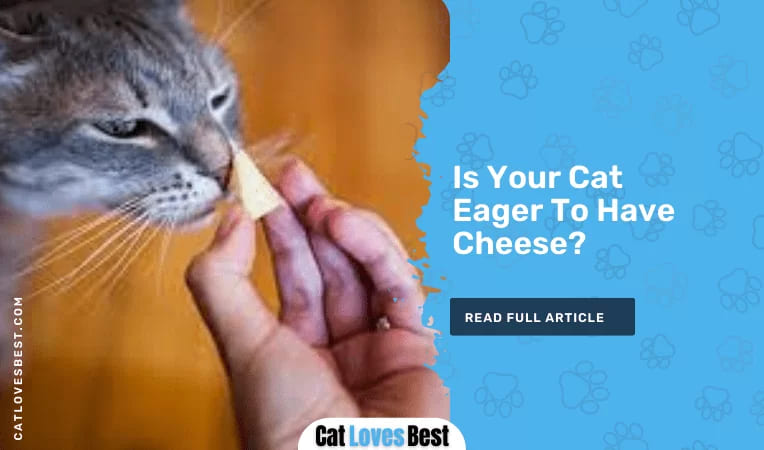
It is always wise to ensure the safety of your feline friend whenever you introduce new food to your furball’s diet.
Cats have a very sensitive digestive system, there are many human foods that are safe for us, however, the same foods might cause major health consequences in felines.
Can Cats Eat Cheese?
The short answer is yes, cats can safely eat cheese but don’t overfeed it. In fact, Cheese is non-toxic or poisonous to cats. Your furball can safely eat a few bites of cheese.
However, if cats overeat cheese, they may experience an upset stomach simply because the cheese is a dairy product & it may be higher in carbs and fat than your cat is used to.

The most important question do your cat really needs to eat cheese. As you may know that cats are obligate carnivores, so they consume nutrients from their meat.
If you know in the wild they do not have any plants or cheese on their diet. In simple words dairy is not a part of a cat’s diet, also cheese does not offer any of the nutritional benefits to your furball.
A healthy cat’s diet should be rich in protein & healthy fats. You can give them treats, but they should not exceed more than 10% of their daily calorie consumption.
When is Cheese Bad For Cats?
If you are feeding cheese in a moderate amount then it is good. If you are giving too much then it may lead your cat to gastrointestinal (GI) problems, diarrhea, vomiting, nausea, bloating, and flatulence.
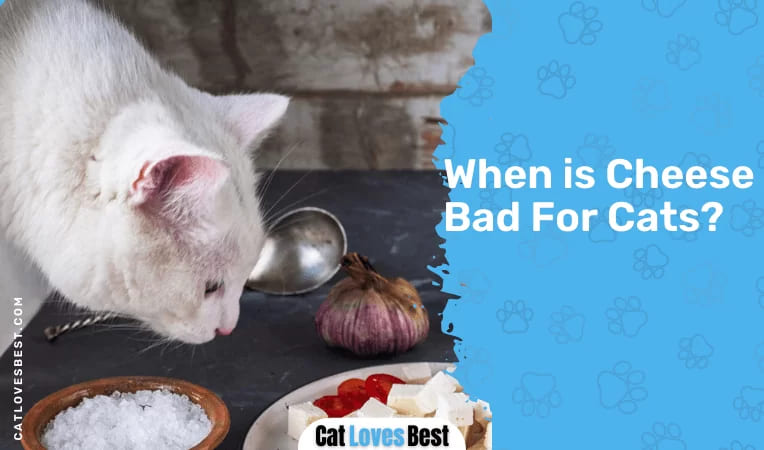
Check out if your cat is suffering from these then you should not feed cheese to your cat. Make sure to consult the veterinarian with your feline.
- Lactose intolerance
There is a most enduring myth about felines is they love to eat dairy products. Cats are lactose intolerant, as it is not in their regular diet, and they cannot digest the dairy products that easily.
You should be aware that cats do not produce an enzyme called lactase. It is the essential enzyme to break down the sugars that emerge naturally in dairy products (known as lactose).
In fact, some cats can tolerate dairy products better than others. Now, how you can find out that your cat is lactose intolerant? Whenever you feed them cheese if you see any symptoms of diarrhea within 8 to 12 hours then your cat is lactose intolerant.
- Dairy allergies
If your cat cannot digest the cheese or any other dairy product, then an upset stomach is the first thing they will suffer. It is never fun having, it might lead to severe consequences.
You may notice skin disorders or gut problems, even by consuming a small amount of cheese. In very few cases you may see an anaphylactic reaction can occur, it may be potentially life-threatening.
- High sodium content
If your cat has a health condition, such as kidney or heart disease, then your veterinarian might suggest you monitor your cat’s salt intake.
As you may know that dairy products have a good amount of sodium. That’s the reason only a few cats can eat dairy products. You should always consult your veterinarian before you introduce new food to your feline.
- High fat and calorie content
If you feed cheese to your cat then you may know that cheese has a good amount of fat. If you are feeding cheese on a regular basis then they might quickly become overweight.
Many of you know that if your cat has weight then significantly it will reduce the life of your cat’s life expectancy. Moreover, it will attract more secondary health issues.
- Harmful additive ingredients
There are few ingredients that make cheese harmful for cats, now it is on you what type of cheese you offer to your cat.
If you are feeding cheese with garlic, onions, and chives, they are highly toxic for your cat. These toppings may break down the red blood cells of your pet. It will lead to anemia, so you should be sure that if you are feeding cheese to your cat then avoid these toppings.
Are There Nutritional Benefits to Feeding Your Cat Cheese?
As I mentioned above that cats are obligate carnivores, they get all the nutrients from meat. You should provide a balanced diet to your cat if you want to keep your cat healthy.
You might know that cheese has no nutritional benefits for cats, it is filled with fat & very less amount of protein. Still, you can provide them as a treat but only 10% of their daily consumption.
What Types of Cheese Can Cats Eat?
If you know there are different types of cheese available on the market, let’s see what type of cheese is more suitable for your cat.
Can Cats Eat Blue Cheese?

If you are having blue cheese-like stilton, you should not feed your cat blue cheese. As it contains more ‘Penicillium’, which can be toxic for your feline.
You might think that blue cheese is low in lactose (0.5 grams per 100 grams), However, it’s still high in fat. So the answer is, do not feed blue cheese to your furball.
Can Cats Eat Parmesan Cheese?
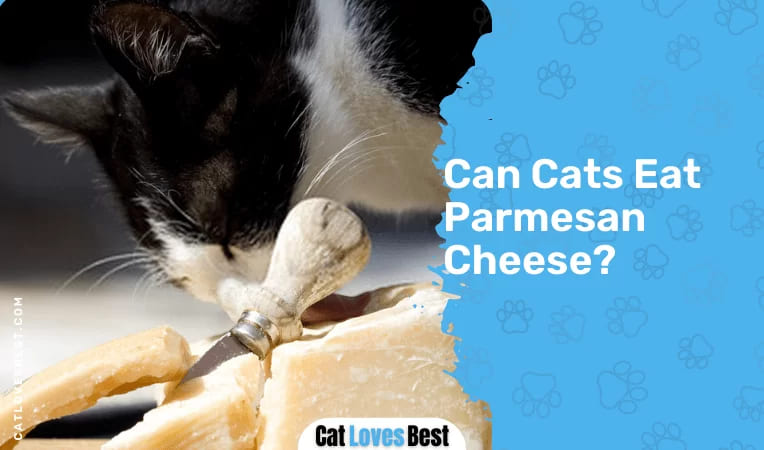
You may be aware that parmesan is a hard cheese, and it contains less lactose than soft cheese like mozzarella, cottage cheese, and cream cheese.
Which makes it easy for cats to digest the cheese. You can feed parmesan cheese to your cat but it should be in very moderate quantity and on occasions.
Can Cats Eat Goat Cheese?
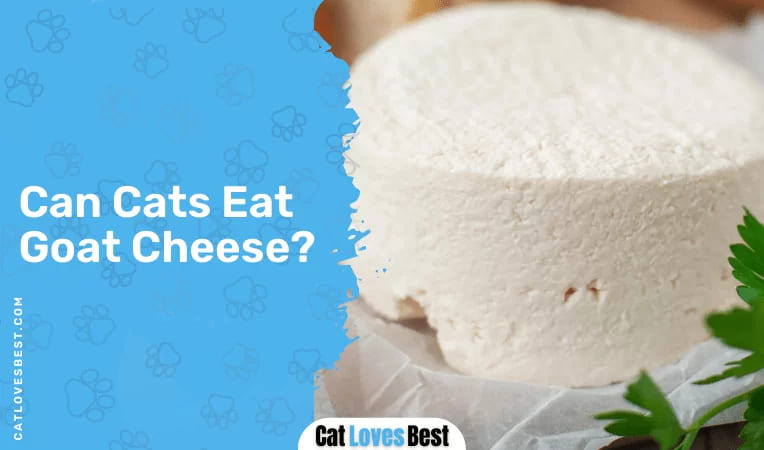
If you have ever tasted goat milk then you may know it is very light when you consume it rather than cow or buffalo milk.
Goat milk contains less amount of lactose, In fact, it contains less salt compared to the other cheese. So it is generally considered safe cheese for cats.
Can Cats Have Non-Dairy Cheese?
Do you want to know whether lactose-intolerant cats can have non-dairy cheese, the short answer is no. Do you know that these non-dairy cheeses are very high in salt and fat, so this cheese might not be a good fit for your furball.
How to Feed Cheese to Cats
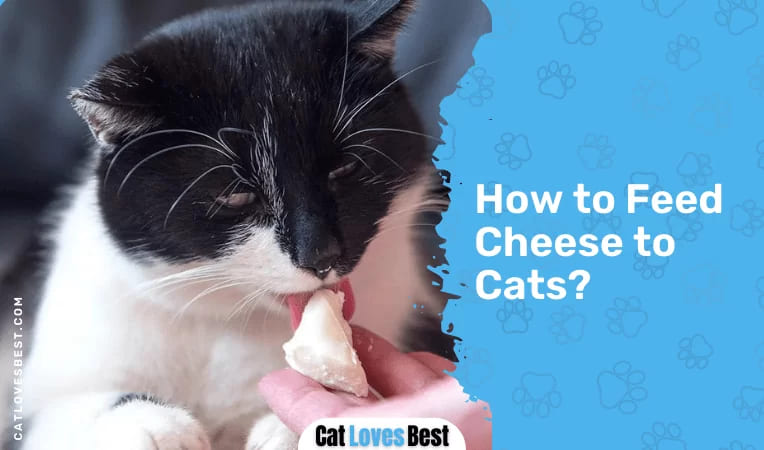
If every possible is perfect in your case then you should surely check out the tips on how to feed cats cheese safely. Make sure you have consulted your veterinarian. Let’s get into it.
- You will have to cut the cheese into small pieces, that cat can easily swallow or chew.
- Make sure that you do not provide more than 10% of their daily consumption. Check on the label for calories the cheese contains.
- Having a word with your veterinarian can help you calculate, how much you can feed your cat, based on their weight, age, and nutritional needs.
- Make sure it does not contain any harmful ingredients such as garlic.
- You should just feed them 2 or 3 pieces like a treat not more than that, monitor your cat for 24 hours. If you see any symptoms like digestive distress, diarrhea, or vomiting, then you should visit your vet.
FAQs
Can cats eat Ice cream?
Ice cream is a good choice for cats, in fact, it is high in sugar & fat. Also, ice creams contain essences like vanilla, chocolate, mango, etc. These ingredients are taste enhancers for humans but it is really toxic for cats.
Why do cats love cheese?
There are two reasons why cats love cheese. As the cheese texture is similar to meat, so they feel like it is white meat.
Moreover, they need a good amount of fat, and the cheese is high in fat, so they might be attracted to cheese. It is fine if you are feeding cheese to your cat but in a very moderate amount.
Can cats eat cottage cheese?
Cottage cheese is generally considered safe for cats, but you should provide it in a very moderate amount. As it cottage cheese contains more lactose compared to other cheeses.
Monitor your cat’s health for 24 hours after feeding. If you see any symptoms like vomiting, diarrhea, or constipation, then you should visit your veterinarian.
Can kittens eat cheese?
Since kittens are on mother milk, you might be wondering whether cheese is bad for your kittens. The kittens can produce the lactase enzyme until they start weening.
By the time they start eating solid food like cheese, the kitten’s body stops producing the lactase enzyme. So this makes it difficult for kittens to digest the cheese. The best suggestion is for you should never feed the cheese to your kitten on regular basis.
Final Thoughts
This leads us to the end of this can cats have cheese article, let’s wrap this article here. I hope you got all the answers that you had related to ? “can cats eat cheese?”.
If you are feeding your cat a bit of cheese then it shouldn’t be a problem but you should consult your veterinarian before you introduce human food to your cat.
If still, you have any doubts related to can cats eat cheese, then feel free to leave them in the comment section below. I would surely get back to you with the best possible answer.
Are feeding cheese to your furball then do let us know the experience, we all would love to hear them.
References:
- The Truth About Dairy Products and Pets — PetMD
- Pet Nutrition — Community Care College
- Nutrition- General Feeding Guidelines for Cats —VCA animal hospitals

